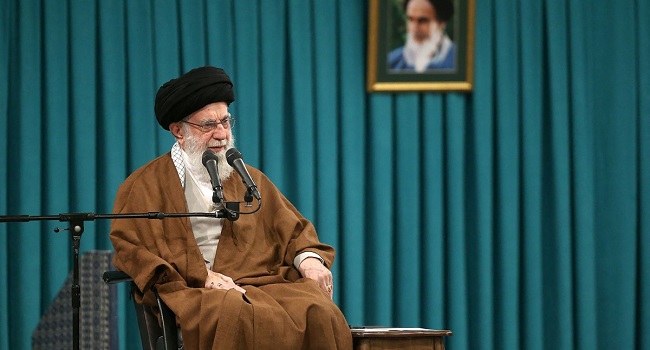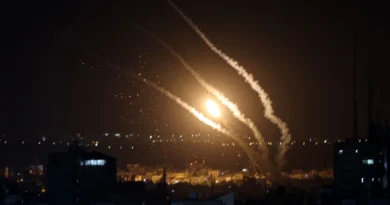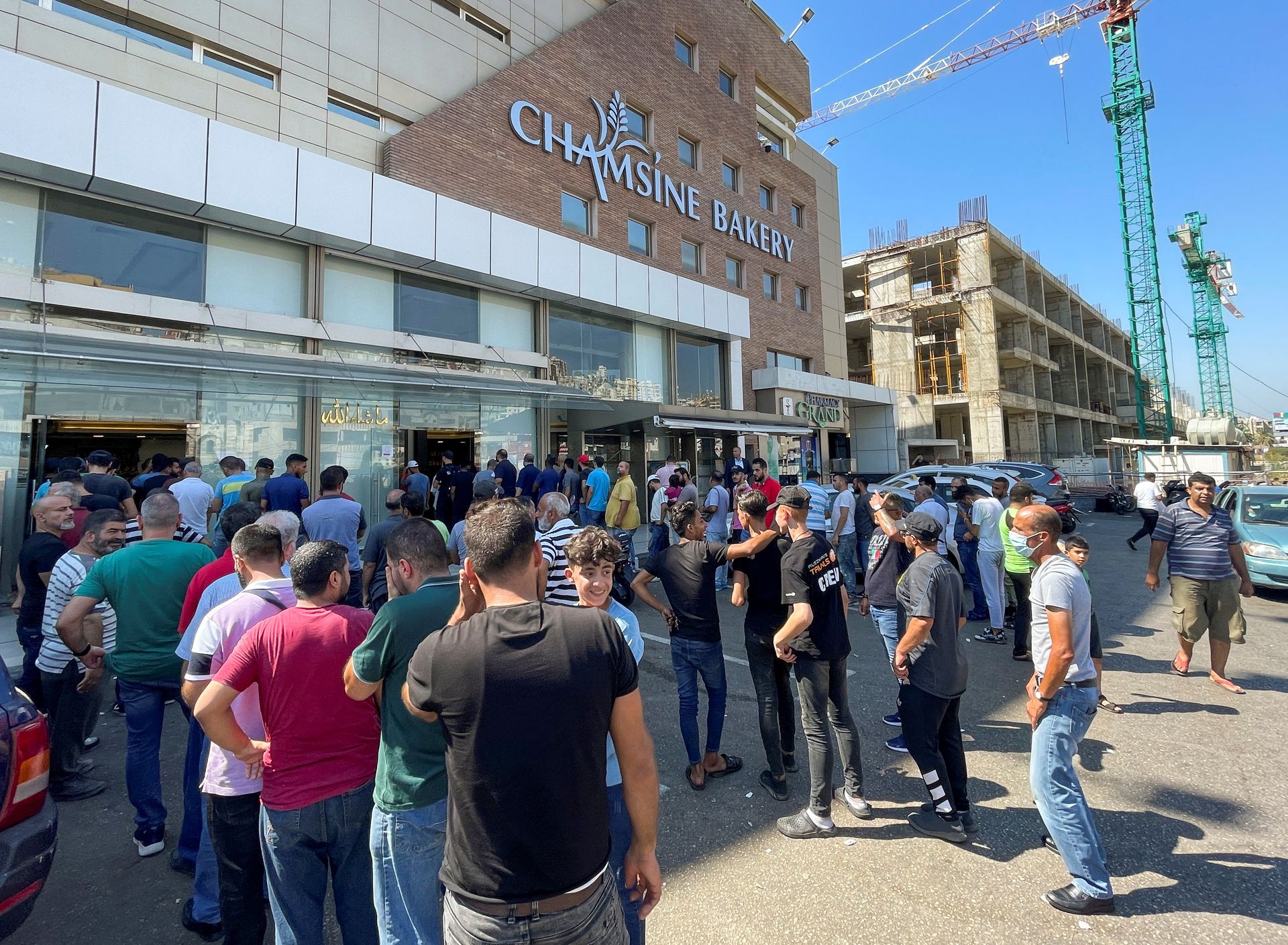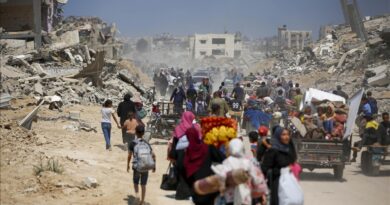Iran Promises Self-Defense After Deadly Israeli Strikes
Iran threatened on Saturday that it would defend itself after Israeli air strikes killed at least four soldiers, escalating concerns of a full-fledged Middle East war.
Israel warned Iran that it would “pay a heavy price” if it replied to the strikes, while the US, Germany, and the UK urged Tehran not to escalate the situation.
Following the pre-dawn Israeli strikes, US President Joe Biden expressed his hope that “this is the end,” noting that “it looks like they didn’t hit anything other than military targets.”
Biden had asked Israel to avoid nuclear and oil installations in its retaliatory strikes, and the International Atomic Energy Agency reported that no nuclear sites had been targeted.

The European Union urged all parties to exercise extreme caution in order to avoid a “uncontrollable escalation”.
Other countries, including many of Iran’s neighbors, denounced Israel’s strikes, and others, such as Russia, urged both parties to exercise caution and avoid what Moscow described as a “catastrophic scenario”.
Iran claimed the “right and duty” to protect itself, while its Lebanese partner Hezbollah said it had already launched missile salvos at five residential districts in northern Israel.
The Israeli army said that 80 rockets were fired across the border on Saturday.
Hezbollah later issued evacuation advisories for over a dozen identified places in Israel, while the Israeli army issued similar cautions for two neighborhoods in southern Beirut.
Lebanon’s official National News Agency reported early Sunday that Israel had carried out a fresh raid in Beirut’s southern suburbs.
‘Limited damage’
Confirming its own strikes after explosions and anti-aircraft fire echoed around Tehran, the Israeli military said it had hit Iranian missile factories and military facilities in several provinces.
The “retaliatory strike has been completed and the mission was fulfilled”, and Israeli aircraft “returned safely”, a military spokesman said.
Iran confirmed Israel had targeted military sites around the capital and in other provinces, saying the raids caused “limited damage” but killed four soldiers.
Iran’s armed forces general staff said only radar systems were damaged in the strikes and held back from any threat of immediate retaliation.
“While reserving its legal and legitimate right to respond at the appropriate moment, Iran is prioritising the establishment of a lasting ceasefire in Gaza and Lebanon,” it said.
Foreign Minister Abbas Araghchi held telephone talks with his Egyptian, Qatari and Syrian counterparts.
Qatar’s Sheikh Mohammed bin Abdulrahman Al-Thani, a key mediator in Gaza truce efforts, voiced “deep concern over the serious repercussions that may result from this escalation,” his ministry said.
Direct attack
Israel had vowed to retaliate after October 1, when Iran fired around 200 missiles in only the second ever direct attack against its arch-foe. Most of those missiles were intercepted but one person was killed.
The Israeli retaliation drew condemnation from Iraq, Pakistan, Syria and Saudi Arabia, which warned against further escalation. Jordan said Israeli jets had not used its airspace.
Turkey was one of the most outspoken critics, calling for an end to “terror created by Israel”.
Israel is already engaged in combat on two fronts.
Since last month, it has been fighting a war against Hezbollah in Lebanon, including strikes that have killed the group’s senior leadership and ground incursions seeking to destroy missile sites.
And, for more than a year since Hamas’s October 7, 2023 attack, Israel has been fighting a war in Gaza that has caused mass civilian casualties in the densely populated Palestinian territory.
The United Nations has warned the “darkest moment” of that conflict was unfolding, with Palestinians facing a dire humanitarian crisis and daily Israeli bombing.
True ally’
A defence official said there was “no US involvement” in the strikes on Iran, but afterwards Israeli President Isaac Herzog paid tribute to “our great friend the USA for being a true ally, and for the overt and covert cooperation”. He did not elaborate.
US National Security Council spokesman Sean Savett said Israel’s response was “an exercise in self-defence”.
He urged Iran to “cease its attacks on Israel so that this cycle of fighting can end without further escalation”.
The Israeli military has blamed “Iran and its proxies” in the region for “relentlessly attacking Israel since October 7”, when Hamas attacked Israel, triggering the Gaza war.
That attack resulted in the deaths of 1,206 people, mostly civilians, according to an AFP tally of Israeli official figures.
Militants in Gaza continue to hold dozens of captives taken that day.
Israel’s retaliatory bombardment and ground battle in Gaza have killed 42,924 people, the vast majority of them are civilians, according to estimates from the Hamas-run territory’s health ministry, which the UN considers accurate.
In late September, Israel shifted its focus to Lebanon, striking Hezbollah targets and leaders before putting in ground troops.
Israel claims the goal is to make the north of the country safe for tens of thousands of displaced civilians to return.
An AFP assessment of Lebanese health ministry records shows that at least 1,615 people have been killed in Lebanon since September 23.
Iran launched almost 300 drones and missiles against Israeli land in April, marking its first direct attack.
Tehran claimed the barrage was reprisal for a hit on Iran’s consular annexe in Damascus, which killed Islamic Revolutionary Guard Corps officers.
Later in April, explosions rattled Iran’s Isfahan province, according to US officials quoted by American media as Israeli retribution.
Iran claimed that its missile attack on Israel on October 1 was in response for an Israeli air raid that killed Hezbollah chairman Hassan Nasrallah and the death of Hamas senior leader Ismail Haniyeh in Tehran.
On Friday, Gaza’s health ministry accused Israeli forces of storming the sole operational hospital in the territory’s north, claiming two children were killed.
The Israeli military claims it is aiming to disrupt operational capabilities that Hamas is attempting to rebuild in the north.
AFP



